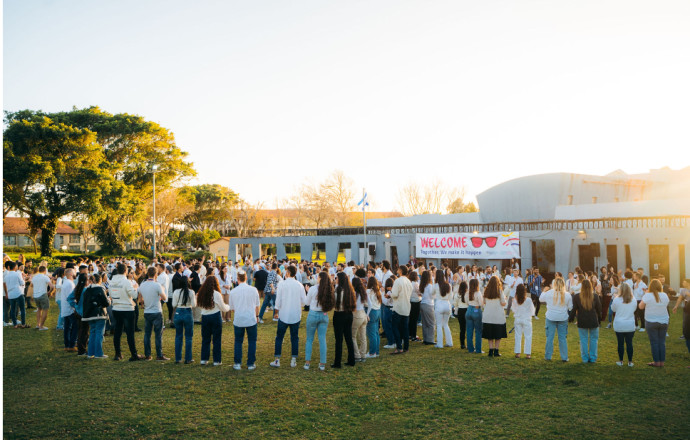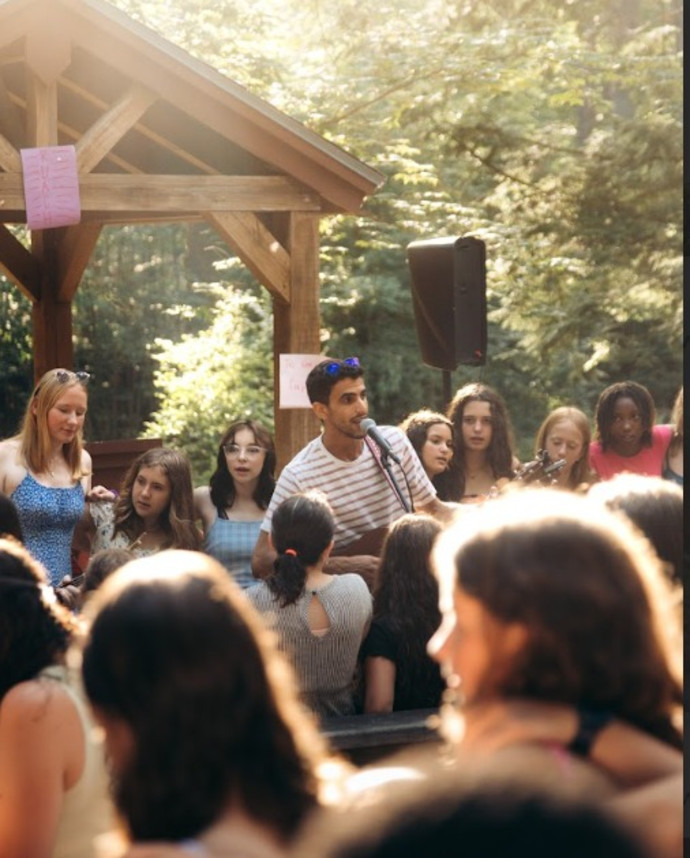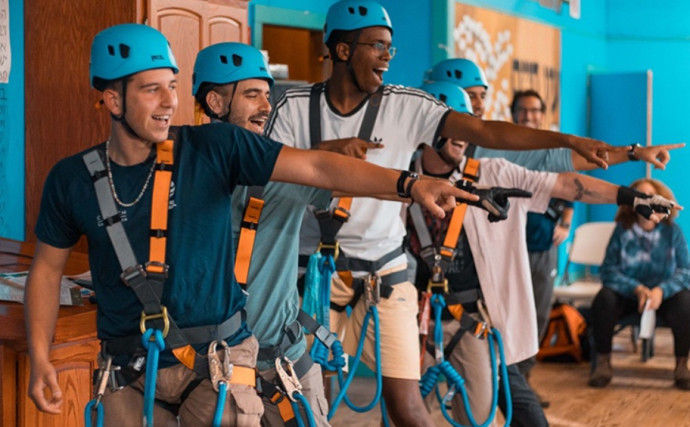‘My bottom line,” says Gal Atia, director of the Summer Shlichut Program at The Jewish Agency for Israel, “is connecting people.” Shlichut is the Hebrew word for “mission,” and this summer, 1,500 young Israelis ages 19-25 fanned out across North America to 158 summer camps, making it their mission to connect and create bonds with Jewish teens. As another successful summer season comes to a close, these Jewish Agency shlichim brought an important taste of Israel to camps throughout North America.
The Hebrew word “shaliach,” which is related to the word shlichut, is usually translated as emissary, and the Israelis who join Jewish camps enjoy their work, representing Israel. Says Ron Halwani, shlicha at 6 Points Sports Academy in Asheville, North Carolina: “I love the fact that I am the person who brings Israel to camp. The impact I have on the campers and my co-counselors, and everyone else is so important to me. And it gives me joy to see their reactions when they see me or when I say something in Hebrew. It brings me a lot of joy and happiness.”


Gily Ariely, a Jewish Agency summer shlicha from Ashkelon serving at Camp Louise in Maryland, adds, “I think representing Israel abroad is such a privilege because we get to make Israel fun, positive, and engaging for all those kids who may not have this back home. Their parents often rely on camps being their source of knowledge of all things Israel. As a shlicha, our role is so important because we have the opportunity to shape or reshape someone’s view of Israel.”
Representing Israel abroad is such a privilege because we get to make Israel fun, positive, and engaging for all those kids who may not have this back home.
Atia, who served as a shaliach for 14 years at Camp Ramah in Wisconsin, explains that the key to being a successful shaliach lies in creating meaningful relationships with the campers. Speaking with North American teens, he says, is more about sharing experiences and dealing with situations than sharing dry knowledge and facts about Israel.
Building strong relationships with teens resulted in honest and open conversations about Israel, he explains. “I learned through the years that if you feel comfortable enough and the other side feels comfortable enough, you can get into a deep conversation that shows how close and relatable messaging can be. I always pushed for complex conversations. Israel is a complex place. Things are not black and white. Here, everything is in shades of gray.”

The Jewish Agency shlichim undergo four days of hands-on training in Israel in March and April, along with 200 representatives from the summer camps. The Jewish Agency is the only organization today that conducts such significant and extensive training courses for its emissaries who work at the camps. Most of the training takes place through informal activities that create a meaningful experience in preparation for working at the camps. Shlichim learn the rules and structure of the camps and the cultural differences that exist. “We give them the tools, teach them how to work with kids, and how they bring Israel through their story,” says Atia. “Once the relationship has been formed and they get to know you, you can bring more complexity to the conversation.”
Most of the shlichim have never experienced a summer camp in North America. For them, the summer camp culture is very difficult to explain. Shlichim learn about the structure of the camps, the schedule, their professional roles, the cultural gaps between Israel and North America, and how to bridge those gaps.

The Summer Shlichut program, which is run in partnership with Jewish Federations, not only serves to forge connections between campers and Israel but is also an eye-opening learning experience for the shlichim themselves, most of whom do not have a previous understanding of the Jewish community in North America.
Before he first arrived in the United States for the Summer Shlichut Program as a basketball specialist at Camp Ramah in Wisconsin, Atia had been unaware of the Jewish world outside Israel.
Many Jewish Agency shlichim who spend the summers at Jewish camps are exposed to Jewish customs for the first time in their lives.
“The first thing I thought was, ‘Why do they care more about Israel and Judaism than me?’ It would be easier for them not to care about it. It made more sense for them not to be Jewish and not to think about Israel from my perspective at that time, and yet, they chose to do that. It impacted me and how I could be more intentional about these things. That changed my perspective and the reason why I do what I do. No one questioned my values, and suddenly I met people who chose to speak Hebrew, who put Israel as a central value in their camps. All these things don’t make sense almost until you interact with them, and you hear their answers, and you understand why the Jewish people are the Jewish people.”
He adds, “I was exposed to people who cared about being Jewish. I learned to become more tolerant and more accepting. You have to understand there are other opinions, and you have to relate to that person as if he has the truth, and you have the truth. But only camp and meeting people from different backgrounds helped me understand that.”
Many Jewish Agency shlichim who spend the summers at Jewish camps are exposed to Jewish customs for the first time in their lives. Shlichim have recounted that their religious experiences in these camps marked the first time they felt a sense of belonging to the Jewish community. For many of them, some of whom were not raised in a religiously observant Jewish environment, being in a North American Jewish summer camp was the first time they wore a kippah, donned tefillin, and participated in prayers. Atia says that the recitation of the Grace after Meals (Birkat Hamazon) struck a particular chord with shlichim, who enjoyed the joyous singing experience.
The benefits that accrue from sending 1,500 Jewish Agency shlichim annually, both for the emissaries and the campers, are immeasurable. Working in North American summer camps is an empowering experience that can lead to making significant choices in the lives and career choices of the shlichim. At summer’s end, they will return as Israelis who have been exposed to the entire Jewish people, and who can bring the voice of North American Jewry to their daily lives.
In turn, as a result of their interactions with shlichim, North American campers experience “major excitement from the environment at camp when it comes to Israel,” says Liav Rivlin, a shaliach at J-Day Camps in Cleveland.
“We have a lot of opportunities to talk to the campers and to be with them, and they’re asking a lot of questions about us,” says Rivlin. “I feel that we are really representing Israel by telling them our stories, our culture, our history, and what we are doing here.”
“You can really feel why we are called shlichim, and you can really feel the purpose of why we came to camp,” adds Sahar Vaknin, a shaliach at Camp Young Judaea Sprout Lake in Verbank, N.Y. “At some point throughout the summer, this place felt more like a home away from home, and the people in it felt like my second family, rather than just a summer camp.”
Jewish Agency Chairman of the Executive Major General (Res.) Doron Almog sums up the impact that the shlichim make in summer camps every year.
“I recently visited some of The Jewish Agency shlichim at summer camps in the United States, and it was heartening to see how they bring the spirit of Israel to America, creating a special bond with campers and a connection to Israel. The deep impact of shlichim is something that lasts long after the summer is over,” Almog says. “These shlichim also return to Israel with a deeper appreciation of North American Jewry and a sense of Jewish peoplehood, making this a wonderful way to strengthen the ties between our next generation across Israel and world Jewry.”
This article was written in cooperation with The Jewish Agency.
